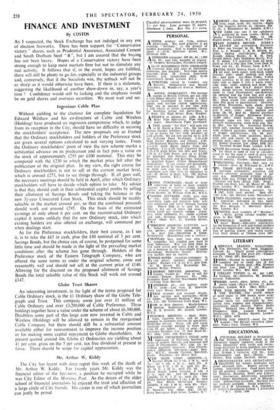FINANCE AND INVESTMENT
By CUSTOS As I suspected, the Stock Exchange has not indulged in any eve of election fireworks. There has been support for "Conservative victory" shares, such as Prudential Assurance, Associated Cement and South Durham Steel " B ", but I am assured that the buying has not been heavy. Hopes of a Conservative victory have been strong enough to keep most markets firm but not to stimulate any real activity. It follows that if, in the event, hopes are fulfilled, there will still be plenty to go for, especially in the industrial groups and, conversely, that if the Socialists win, the setback will not be so sharp as it would otherwise have been. If there is a stalemate, suggesting the likelihood of another show-down in, say, a year's time ? Confidence would still be lacking and the emphasis would be on gold shares and overseas securities. We must wait and see.
Ingenious Cable Plan Without yielding to the clamour for complete liquidation Sir Edward Wilshaw and his co-directors of Cable and Wireless (Holding) have produced an ingenious compromise which, to judge from its reception in the City, should have no difficulty in securing the stockholders' acceptance. The new proposals are so framed that the Ordinary stockholders and holders of the Preference stock are given several options calculated to suit varying tastes. From the Ordinary stockholders' point of view the new scheme marks a substantial advance on its predecessor and in fact puts a value on the stock of approximately £295 per £100 nominal. This may be compared with the £230 to which the market price fell after the publication of the original plan. In my view, the right course for Ordinary stockholders is not to sell at the current market level, which is around £275, but to see things through. If all goes well, the necessary meetings should be held in April, after which Ordinary stockholders will have to decide which option to take. My advice is that they should cash in their substantial capital profits by selling their allotment of Savings Bonds and taking the balance in the new 3+-year Unsecured Loan Stock. This stock should be readily saleable in the market around par, so that the combined proceeds should work out around £295. On the basis of the estimated earnings of only about 6 per cent. on the reconstructed Ordinary capital it seems unlikely that the new Ordinary stock, into which existing holders are also offered an exchange, will command par when dealings start.
As for the Preference stockholders, their best course, as I see it, is to take the £65 in cash, plus the £40 nominal of 3 per cent. Savings Bonds, but the choice can, of course, be postponed for some little time and should be made in the light of the prevailing market conditions after the scheme has gone through. Holders of the Preference stock of the Eastern Telegraph Company, who are offered the same terms as under the original scheme, come out reasonably well and should not sell at the current price of £140. Allowing for the discount on the proposed allotment of Savings Bonds the total saleable value of this Stock will work out around £147.
Globe Trust Shares
An interesting investment, in the light of the terms proposed for Cable Ordinary stock, is the £1 Ordinary share of the Globe Tele- graph and Trust. This company owns just over £1 million of Cable Ordinary and over £3,200,000 of Cable Preference. These holdings together have a value under the scheme of about £6,300,000. Doubtless some part of this large sum now invested in Cable and Wireless (Holding) will be allowed to remain in the reorganised Cable Company but there should still be a substantial amount available either for reinvestment to improve the income position or for making some capital repayment to Globe shareholders. At present quoted around 44s. Globe £1 Ordinaries are yielding about 4+ per cent. gross on the 5 per cent, tax free dividend at present in force. There should be scope for capital appreciation.
Mr. Arthur W. Kiddy
The City has learnt with deep regret this week of the death of Mr. Arthur W. Kiddy. For twenty years Mr. Kiddy was the financial editor of the Spectator, a position he occupied while he was City Editor of the Morning Post. As the doyen of the older school of financial journalists he enjoyed the trust and affection of a large circle of City friends. His career is one of which journalism can justly be proud.


































 Previous page
Previous page